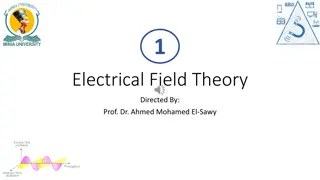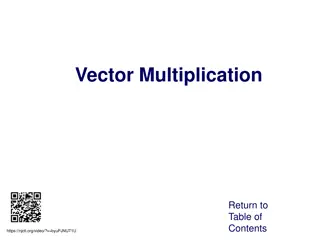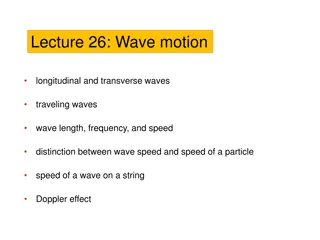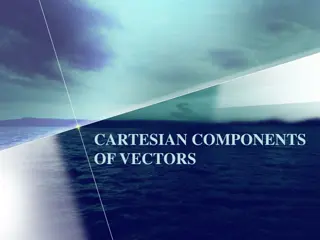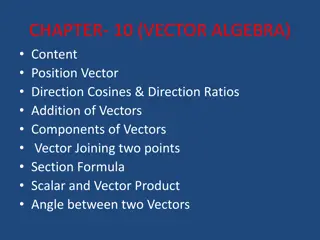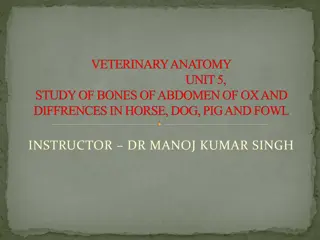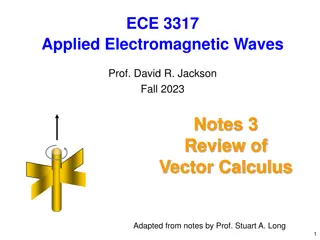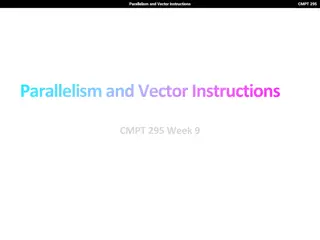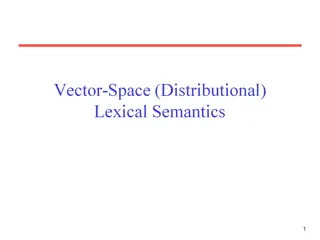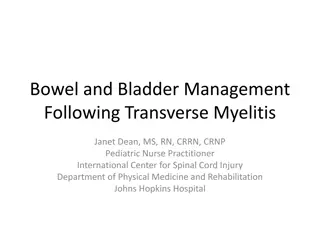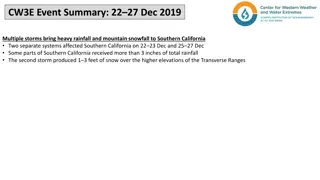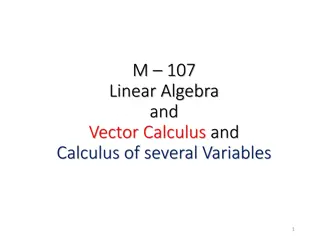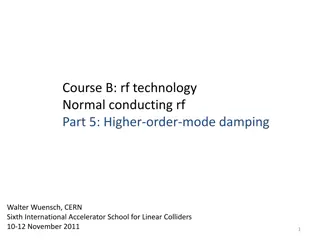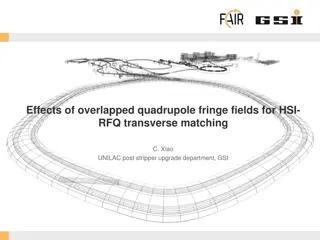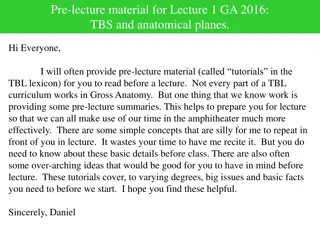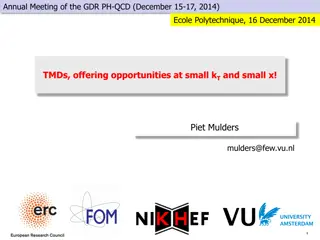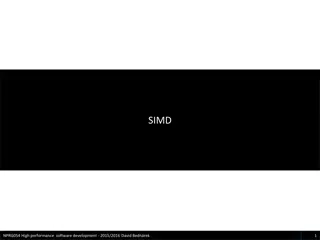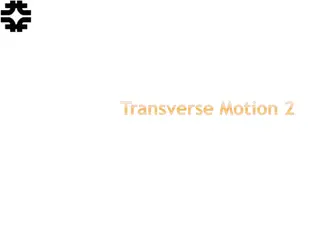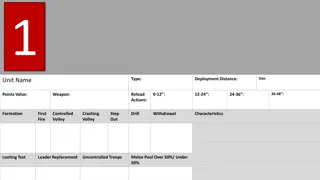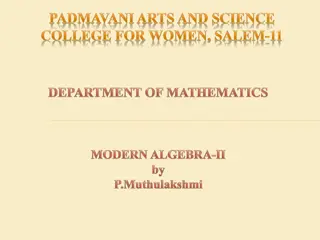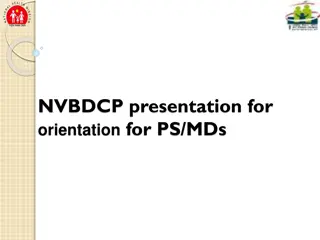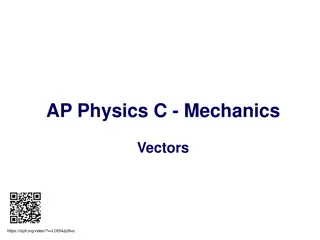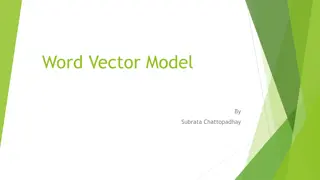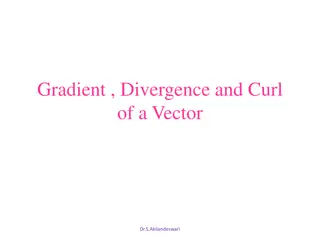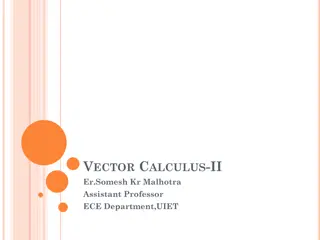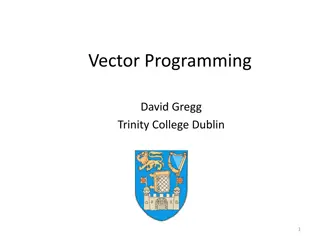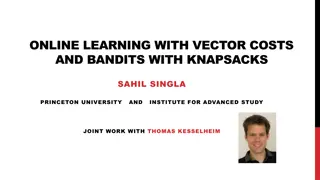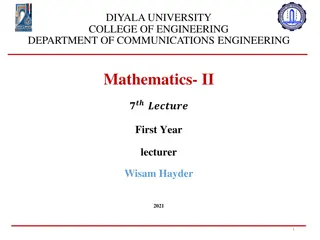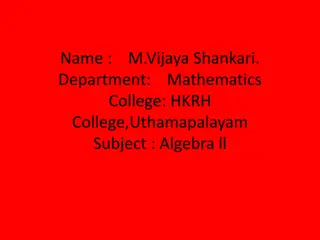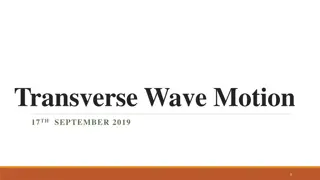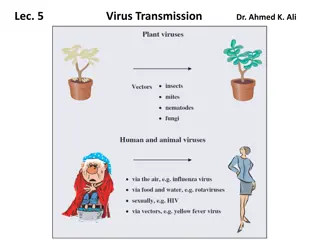Electrical Field Theory: Vector Analysis in Different Coordinate Systems
Explore the principles of Vector Analysis in Cartesian, Cylindrical, and Spherical coordinate systems as applied to Electrical Field Theory. Learn how to calculate differential lengths, areas, and volumes, and solve practical examples under the guidance of Prof. Dr. Ahmed Mohamed El-Sawy.
5 views • 10 slides
Understanding Vector Operations in Linear Algebra
Explore the world of vector operations in linear algebra through this detailed presentation. Learn about vector addition, scalar multiplication, field operations, and more. Gain insights into the notation of Fn and the significance of scalar multiplication and vector addition in linear algebra. Whet
8 views • 9 slides
Understanding Normed Vector Spaces for Nanotechnology Engineering
Introduction to normed vector spaces, focusing on defining norms for vectors in finite-dimensional spaces, exploring different ways to measure vector length, and understanding the concept of unit vectors and norm properties. This topic equips readers with the ability to calculate vector norms, norma
0 views • 9 slides
Vector Multiplication
Learn about vector multiplication, unit vectors, magnitude calculations, scalar dot products, cross products, and angle determinations between vectors. Explore video explanations and visual representations for a comprehensive understanding of vector mathematics concepts.
0 views • 11 slides
Understanding Wave Motion: Longitudinal and Transverse Waves
Explore the fundamentals of wave motion including longitudinal and transverse waves, wave length, frequency, speed, and the Doppler effect. Learn about different types of waves, their characteristics, and the distinction between wave speed and the speed of a particle. Discover the properties of wave
2 views • 18 slides
Introduction to Cartesian Components of Vectors in Two-Dimensional Space
Exploring Cartesian components of vectors in a two-dimensional coordinate frame using unit vectors i and j. Learn how to express vectors, add them using the triangle law, use column vector notation, and find resultant vectors. Understand position vectors in terms of coordinates. Examples and diagram
0 views • 16 slides
Understanding Vector Algebra and Its Applications
Explore the fundamentals of vector algebra, including position vectors, direction cosines, direction ratios, vector addition, scalar product, vector product, and more. Learn about the dot product, cross product, and the angle between two vectors. Visual aids and examples help clarify key concepts in
0 views • 18 slides
Comparative Study of Abdominal Bones in Various Animals
Study of the abdominal bones in the ox highlights characteristics like elongated transverse and curved articular processes, whereas differences in horse bones include shorter bodies and varying curvature of transverse processes. Understanding these anatomical variances provides insights into the uni
0 views • 16 slides
Overview of Vector Calculus for ECE 3317 Course
This overview provides a brief explanation of vector calculus concepts essential for the ECE 3317 course on Applied Electromagnetic Waves. It covers del operator, gradient, divergence, curl, vector Laplacian, vector identities, and their applications in electromagnetic field theory.
0 views • 24 slides
Understanding Basis and Dimension in Linear Algebra
Basis and dimension are fundamental concepts in linear algebra. A basis is a set of vectors in a vector space that allows us to represent any vector by multiplying and adding the basis vectors. The dimension of a vector space is the number of elements in its basis. Linear independence, spanning sets
0 views • 13 slides
Understanding and Addressing Instability in Particle Accelerators
In this document, E. Shaposhnikova from CERN discusses observations and cures for instability in particle accelerators. The content covers types of instabilities, observations like direct and indirect effects, and possible cures such as modifying the source, passive and active damping, and changing
2 views • 30 slides
Understanding Parallelism and Vector Instructions in CMPT 295
Delve into the world of parallelism and vector instructions in CMPT 295 as you explore fixed-length vector intrinsics, RISC-V concepts, computer programming fundamentals, processor execution processes, scalar and vector loops, and more. Discover the intricacies of memory, data arrays, structs, integ
1 views • 45 slides
Understanding Subspaces and Span of Vector Sets
Subspaces are vector sets that satisfy specific properties like containing the zero vector, being closed under vector addition, and scalar multiplication. Examples illustrate these properties and concepts such as the zero subspace and column space. The relationship between column space, row space, a
1 views • 11 slides
Understanding Word Meaning through Vector Space Models
Explore how Vector-Space (Distributional) Lexical Semantics represent word meanings as points in a high-dimensional space. Learn about Semantic similarity, creating sample lexical vector spaces, and using word vectors to measure semantic relatedness. Discover how other contextual features and featur
0 views • 33 slides
Bowel and Bladder Management Post Transverse Myelitis
Following transverse myelitis, there can be significant changes in bowel and bladder function, impacting storage, release, and coordination. Neurogenic bowel and bladder issues, differentiated by injury level, can lead to challenges in controlling sphincters and bathroom habits. Understanding these
0 views • 23 slides
Multiple Storms Bring Heavy Rainfall and Snowfall to Southern California
Multiple storms impacted Southern California in late December 2019, bringing heavy rainfall and significant snowfall to the region. The two separate systems on December 22-23 and December 25-27 resulted in over 3 inches of total rainfall in some parts of Southern California. The second storm brought
0 views • 8 slides
Linear Algebra and Vector Calculus Course Details
This course covers topics in linear algebra and vector calculus, including systems of linear equations, matrices, determinants, vector operations, functions of several variables, differentiation, and optimization. Textbooks by H. Anton and Swokowski are recommended, along with additional lecture not
0 views • 13 slides
Managing Higher-order Modes in Normal Conducting RF Technology
The excitation of higher-order transverse modes due to misalignments between the beam and RF structures can lead to beam instability in linear colliders. This instability can be mitigated by selectively damping the transverse modes and/or detuning the dipole mode frequencies. Understanding the diffe
0 views • 34 slides
Investigation of Overlapped Quadrupole Fringe Fields for HSI-RFQ Transverse Matching
General introduction to the study on quadrupole fringe fields, focusing on investigating the effects of overlapped fringe fields on HSI-RFQ transverse matching by introducing a new QQ focusing system and measuring transmission efficiency with comparisons between simulations and experiments. The stud
0 views • 17 slides
Pre-Lecture Material for Gross Anatomy: TBS and Anatomical Planes
Understand the Typical Body Segment (TBS) concept, a transverse section through the human body, and the importance of anatomical planes for orienting and dividing the body into sagittal, coronal, and transverse sections. Prepare effectively for Gross Anatomy lectures by grasping these foundational c
0 views • 6 slides
Exploring Transverse Momentum Distributions (TMDs) at the GDR PH-QCD Annual Meeting
The Annual Meeting of the GDR PH-QCD focused on discussing Transverse Momentum Distributions (TMDs) and their significance at small kT and small x values. Topics covered include gauge-invariant correlators, PDFs, and PFFs, as well as the utilization of color gauge links in describing partonic transv
0 views • 33 slides
Understanding SIMD for High-Performance Software Development
SIMD (Single Instruction Multiple Data) hardware support utilizes vector registers for high-performance computing. Vector instructions operate on multiple data elements simultaneously, offering scalability and efficient processing strategies. The use of wide vector registers enhances arithmetic oper
0 views • 41 slides
Understanding Transverse Motion in Particle Accelerators
Exploring the formalism and calculations related to transverse motion in particle accelerators, including the Hill equation, transfer matrices, lattice functions, and example drift calculations. The content delves into the mathematical foundations and practical applications of analyzing particle bea
0 views • 16 slides
Unit Name Details and Specifications
Explore the details and specifications of various units including deployment distance, size, weapon details, actions, and characteristics for Unit Name 1, Unit Name 2, Unit Name 3, and Unit Name 4. Each unit has its own unique attributes and is depicted with an image for reference.
0 views • 8 slides
Fundamental Concepts in Vector Spaces and Inner Product Spaces
A vector space over a field F is characterized by operations such as addition and scalar multiplication. Subspaces, direct sums, linear combinations, linear spans, dimensions, and dual spaces are fundamental concepts in vector spaces. Moving into inner product spaces, the concept of inner products,
0 views • 13 slides
National Vector Borne Disease Control Program Overview
The National Vector Borne Disease Control Program (NVBDCP) focuses on preventing and controlling diseases such as Malaria, Dengue, Chikungunya, Filariasis, Japanese Encephalitis, and Kala-azar. Implemented at state level, NVBDCP aims to eliminate these diseases through strategic planning, policy mak
0 views • 9 slides
Language Operations for Quantum Computers: Implementing Vector-Based Approaches
Exploration of language operations suited for quantum computing, focusing on vector-based techniques for NLP tasks such as text search, factorization, classification, and logic operations. Topics include analogy, composition, inference, and the significance of negation in semantic vector operations.
0 views • 23 slides
Understanding Vectors in AP Physics C: Mechanics
Explore the fundamental concepts of vectors in AP Physics C: Mechanics, including scalar vs. vector quantities, vector operations, and vector multiplication. Discover the significance of vectors in explaining and predicting physical phenomena through graphical methods and mathematical equations. Div
0 views • 28 slides
Understanding Word Vector Models for Natural Language Processing
Word vector models play a crucial role in representing words as vectors in NLP tasks. Subrata Chattopadhyay's Word Vector Model introduces concepts like word representation, one-hot encoding, limitations, and Word2Vec models. It explains the shift from one-hot encoding to distributed representations
0 views • 25 slides
Understanding Gradient, Divergence, and Curl of a Vector with Dr. S. Akilandeswari
Explore the concepts of gradient, divergence, and curl of a vector explained by Dr. S. Akilandeswari through a series of informative images. Delve into the intricacies of vector analysis with clarity and depth.
0 views • 13 slides
Understanding Vector Calculus II Concepts with Examples by Prof. Somesh Kr. Malhotra
Explore advanced topics in vector calculus including gradient, divergence, curl, and theorems like the Divergence Theorem and Stokes' Theorem. Follow along with examples presented in Cartesian, spherical, and cylindrical coordinates to deepen your understanding of vector calculus concepts.
0 views • 29 slides
Understanding Vector Graphics in Computer Graphics
Vector graphics in computer graphics are defined by 2D points connected by lines and curves to form shapes. Commonly found in SVG, EPS, PDF, or AI formats, they differ from raster graphics like JPEG or PNG. The W3C standard for vector graphics is SVG, allowing scalable and resolution-independent ima
0 views • 4 slides
Understanding Vector Programming and Machines
Vector programming involves efficient processing of data through SIMD models, parallel computing, and vector extensions in architectures like SSE and AVX. Programming vector machines in C requires addressing challenges with automatic vectorization related to pointers and data layouts.
0 views • 58 slides
Advances in Online Learning with Vector Costs and Bandits with Knapsacks
Explore cutting-edge research on online learning algorithms dealing with vector costs and bandits, including applications in load balancing and bandits with knapsacks. The studies cover topics such as regret minimization, minimizing vector costs, and maximizing rewards while maximizing budget constr
0 views • 17 slides
Understanding Unit Testing in Software Engineering
Concept Software is a discipline comprising various code pieces. Testing these codes together is complex but vital in Software Engineering. The process includes early testing like unit tests, pairwise/multiple component testing, module testing, integration testing, user tests, alpha tests, beta test
0 views • 6 slides
Understanding Vector-Valued Functions and Motion in Space
Explore the concept of vector-valued functions and motion in space, including curves, tangents, position vectors, scalar functions, derivatives, and differentiation rules. Learn how to represent curves in vector form and understand the smoothness of a curve based on its derivatives. Gain insights in
0 views • 28 slides
Algebraic Homomorphisms and Singular Transformations in Mathematics
An exploration of Cayley's theorem analog for groups in algebra, showcasing the isomorphism of algebras with unit elements over fields to subalgebras of some vector space. Additionally, a discussion on characterizing singular transformations in finite-dimensional vector spaces over fields. The expla
0 views • 14 slides
Vector Art Services
At ArtWorkLady, we specialize in providing high-quality Vector Art Services to businesses worldwide. Whether you need raster to vector conversion, logo vectorization, or product illustrations, our experienced team delivers precise and scalable vect
2 views • 5 slides
Understanding Transverse Wave Motion in Physics
Explore the concepts of transverse wave motion, velocities in wave motion, group velocity, dispersion, and the transverse wave equation on a string. Visual examples and explanations enhance the understanding of these fundamental principles in physics.
0 views • 30 slides
Understanding Virus Transmission via Vectors in Hosts
Viruses must be propagated and transmitted to new hosts for survival. They can be spread via vectors like arthropods, which acquire and transmit viruses during feeding. This transmission can occur quickly through the vector's mouthparts or more slowly via circulation in the vector's body. Plant viru
0 views • 14 slides
